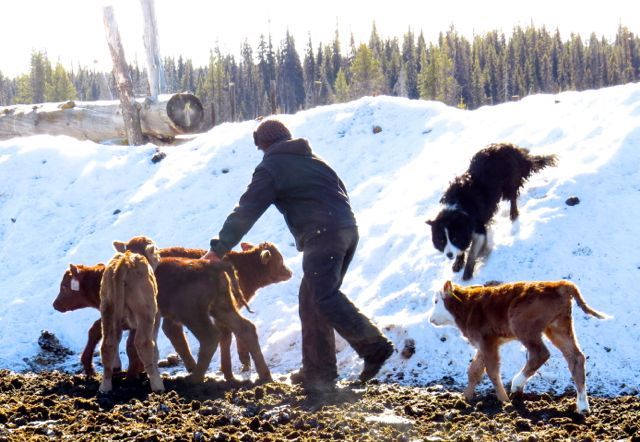 Ginty Creek is surrounded by ranchers, and all are embroiled in calving season right now. Many of them used to calve earlier, for the surviving offspring would be heavier therefore fetch more money at the fall sales, but it was much harder work in the colder weather, with much greater risk of calf loss, that most local ranchers now calve in March and April.
Ginty Creek is surrounded by ranchers, and all are embroiled in calving season right now. Many of them used to calve earlier, for the surviving offspring would be heavier therefore fetch more money at the fall sales, but it was much harder work in the colder weather, with much greater risk of calf loss, that most local ranchers now calve in March and April.
I’ve often mentioned that my neighbours live up to two hours’ drive away: Three Circle Ranch and it’s neighbouring Six Mile Ranch take a little over an hour to get to. Six Mile is owned by Roger and Wanda Williams (Wanda was a Dorsey), and the neighbouring Three Circle is owned by their daughter and husband, Terra (universally known as Punky) and Eli Hatch. Punky writes her own blog: Mountains Beyond The Cows. (Her posts have been short of late as they have been so busy.) The two couples run their ranches together. Most of the action takes place at Six-Mile right now, so that was where I arrived early on a frosty, misty morning.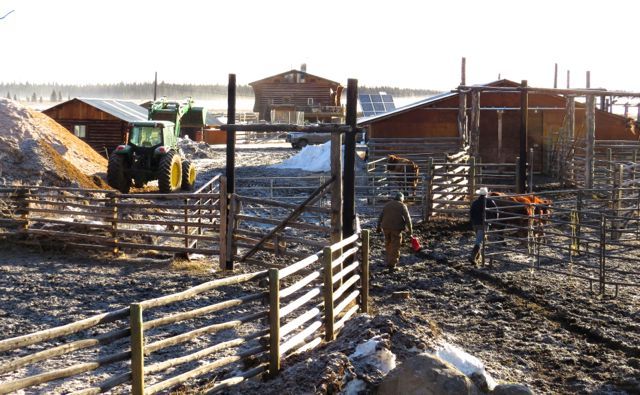 Below the house (note the solar panels) is a complicated array of pens, a veritable maze to the uninitiated. The pens are all ploughed, and I was standing atop a large snowbank to take these first photos.
Below the house (note the solar panels) is a complicated array of pens, a veritable maze to the uninitiated. The pens are all ploughed, and I was standing atop a large snowbank to take these first photos.
First job was breakfast. Some people have been up half the night as the cows are checked every two hours, but everyone gets breakfast at eight.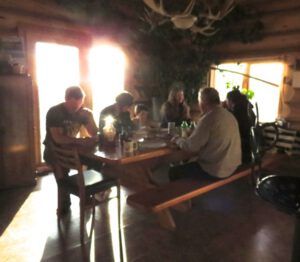 During this time, the fog started to lift. (If you look closely you can see that the ends of some of the hay bales have been pulled out. That is the local moose population having a snack.)
During this time, the fog started to lift. (If you look closely you can see that the ends of some of the hay bales have been pulled out. That is the local moose population having a snack.)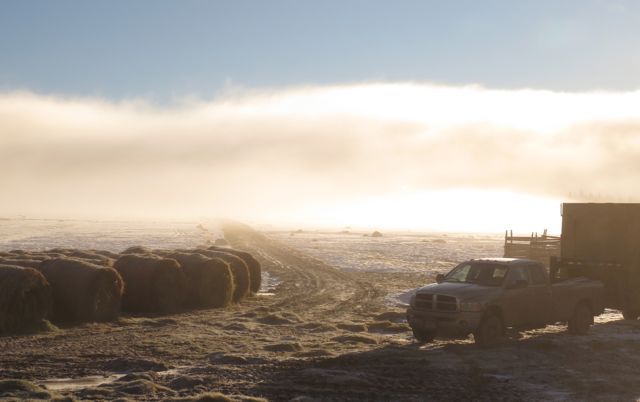 The first job after breakfast was to sort out the older calves with their mothers. Once the babies are strong and vigorous, they are shipped to Three Circle Ranch, where they are spread out into fields to be fed. The combined ranches process 550 – 600 cows a year and if they were all kept in one spot it would be a nightmare of mud and disease. It is only the imminent mums-to-be and the newest babies that are kept around the house. (Punky is in back; helper Paul wears the cowboy hat.)
The first job after breakfast was to sort out the older calves with their mothers. Once the babies are strong and vigorous, they are shipped to Three Circle Ranch, where they are spread out into fields to be fed. The combined ranches process 550 – 600 cows a year and if they were all kept in one spot it would be a nightmare of mud and disease. It is only the imminent mums-to-be and the newest babies that are kept around the house. (Punky is in back; helper Paul wears the cowboy hat.)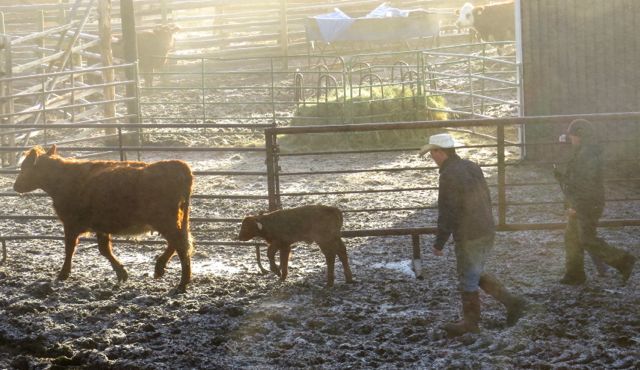
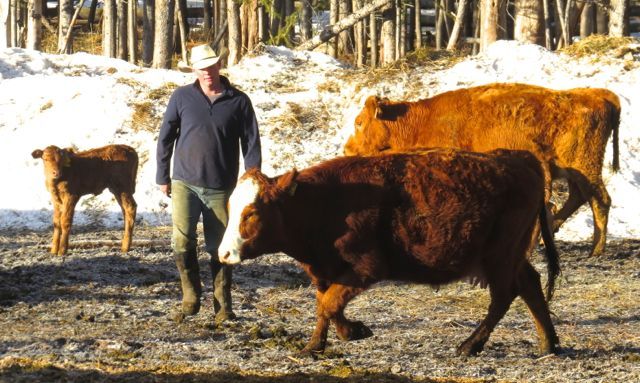 Considering they are semi-wild range cows, they are very calm, but I was sometimes given some susupicious looks.
Considering they are semi-wild range cows, they are very calm, but I was sometimes given some susupicious looks.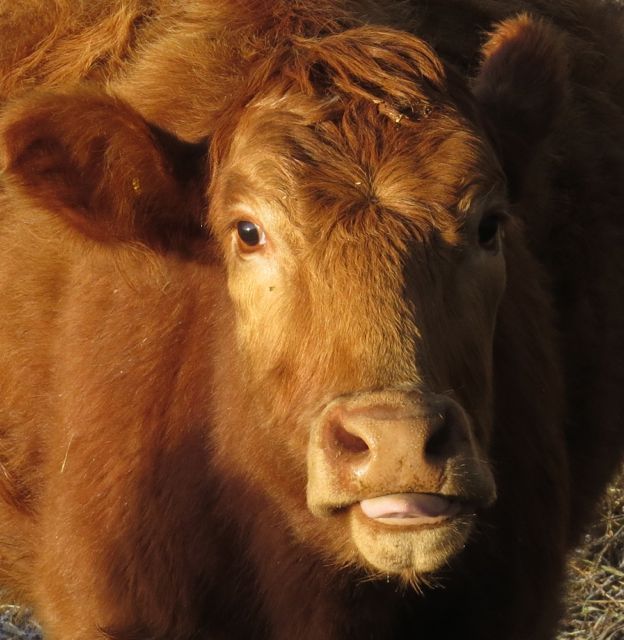 The heifers and second-calvers are kept separate from the older cows, and each batch has to be moved at different times to the feeding areas. Punky says that no one else does as much moving around of livestock as they do, but with such a large number of cattle, that is the only way they feel it will work. “We couldn’t make the system more labour-intensive if we tried,” she confesses.
The heifers and second-calvers are kept separate from the older cows, and each batch has to be moved at different times to the feeding areas. Punky says that no one else does as much moving around of livestock as they do, but with such a large number of cattle, that is the only way they feel it will work. “We couldn’t make the system more labour-intensive if we tried,” she confesses.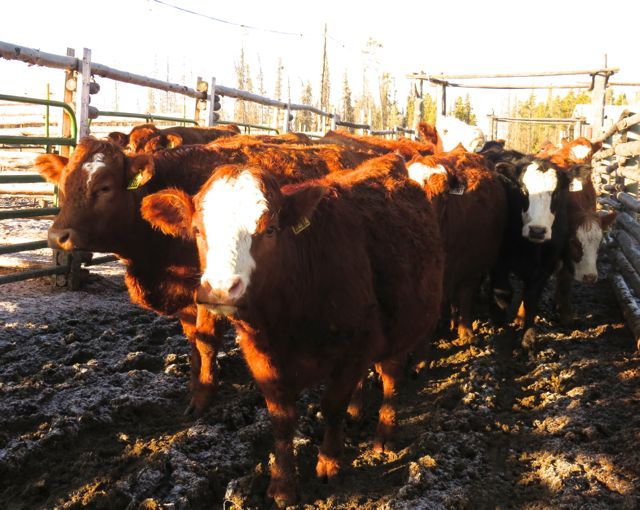 There are always a few calves whose mothers don’t have enough milk, and they have to be fed by dams with milk to spare. As long as her head is in her feed bucket, this house cow doesn’t care which calves are feeding.
There are always a few calves whose mothers don’t have enough milk, and they have to be fed by dams with milk to spare. As long as her head is in her feed bucket, this house cow doesn’t care which calves are feeding. 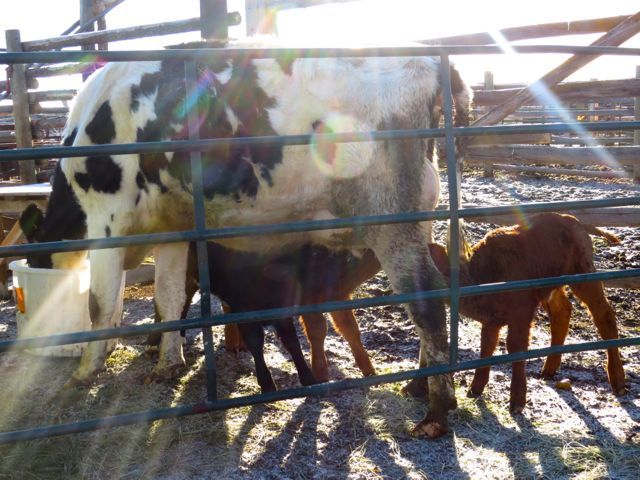 But this mum needs to be a bit restrained in order to give this little twin a good start.
But this mum needs to be a bit restrained in order to give this little twin a good start.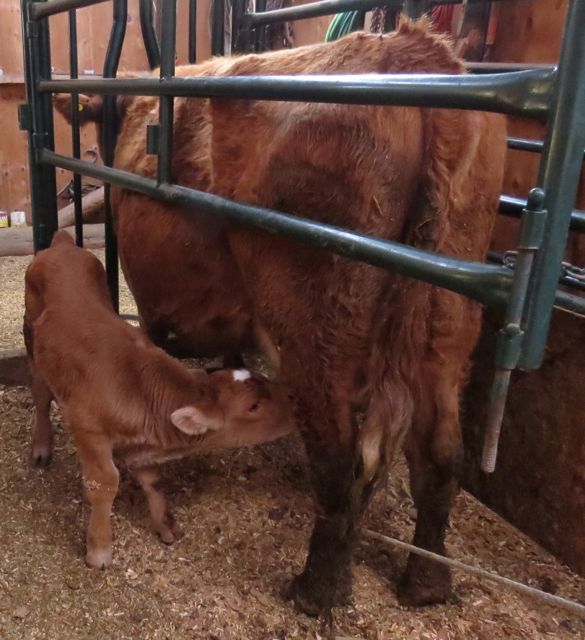 Next job was to take the 4-wheeler about a kilometer away from the buildings to where the later calvers – only about 80 of them left – were kept.
Next job was to take the 4-wheeler about a kilometer away from the buildings to where the later calvers – only about 80 of them left – were kept.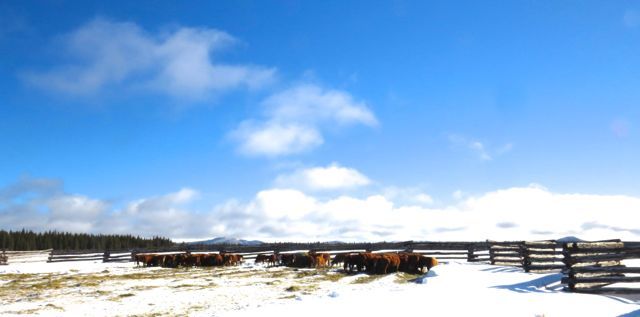
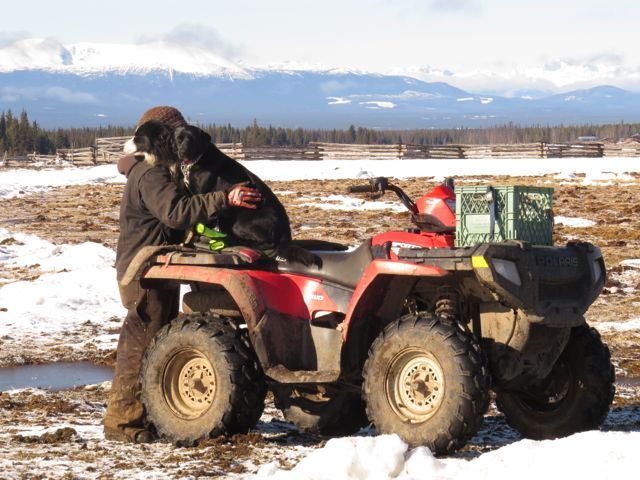 Now that the fog was lifting, there was a panorama of mountains on all sides. I could even see Monarch Mountain poking up. (Monarch is the principal mountain seen from Nuk Tessli.)
Now that the fog was lifting, there was a panorama of mountains on all sides. I could even see Monarch Mountain poking up. (Monarch is the principal mountain seen from Nuk Tessli.) These cows are fed twice a day. Note the lovely green colour of the hay. It shows it was baled without being rained on. There are no seeded pastures on these ranches – all the hay is wild. The natural grasslands in this area was what attracted ranchers here in the first place.
These cows are fed twice a day. Note the lovely green colour of the hay. It shows it was baled without being rained on. There are no seeded pastures on these ranches – all the hay is wild. The natural grasslands in this area was what attracted ranchers here in the first place.
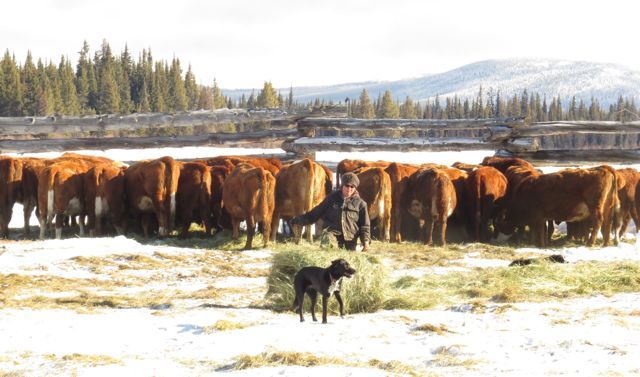
(And what a day we had! SUNNY for a change.)
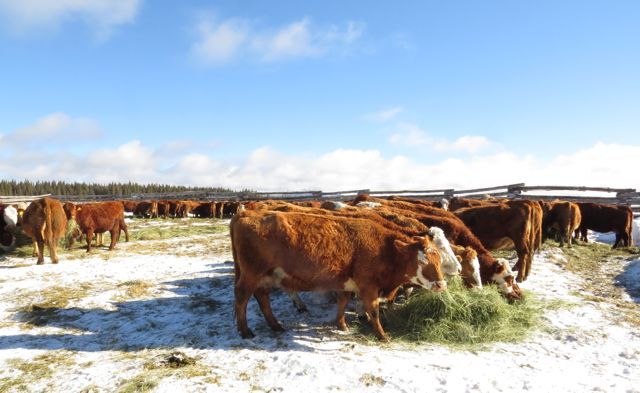 Meanwhile, back at the ranch, things were happening in the calving barn, which smelt deliciously of fresh shavings. This heifer was just about to pop.
Meanwhile, back at the ranch, things were happening in the calving barn, which smelt deliciously of fresh shavings. This heifer was just about to pop.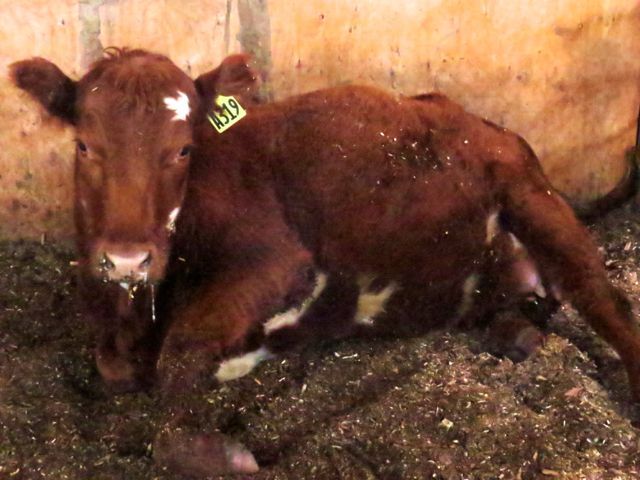 What’s this strange thing? Mmm: smells good!
What’s this strange thing? Mmm: smells good!
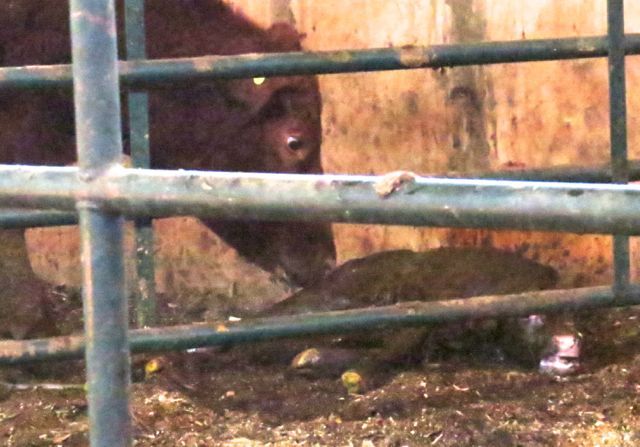 and within moments, the calf’s head is up and it is trying to stand.
and within moments, the calf’s head is up and it is trying to stand.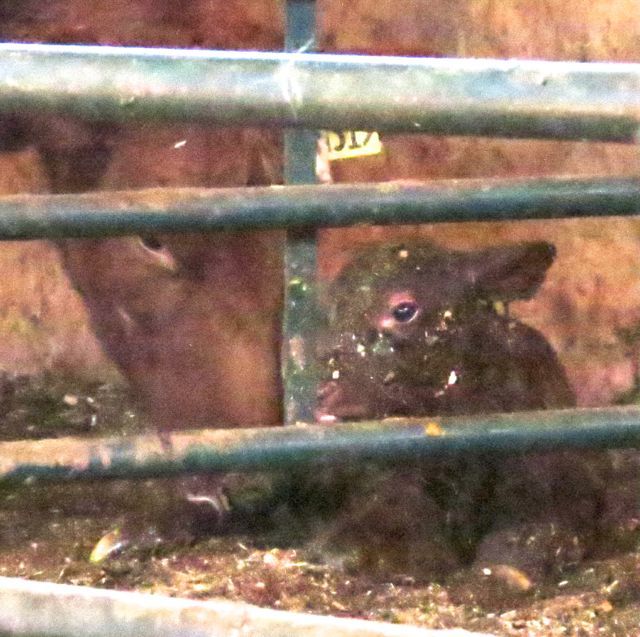 I worked on dairy farms for a number of years and had a lot of experience calving cows. I never fail to be fascinated by this process. Most mums and babies manage it on their own with no problem, but they must all be watched carefully as occasionally one’s nose is covered by the birth sack, or its nose must be cleaned so that it can breath.
I worked on dairy farms for a number of years and had a lot of experience calving cows. I never fail to be fascinated by this process. Most mums and babies manage it on their own with no problem, but they must all be watched carefully as occasionally one’s nose is covered by the birth sack, or its nose must be cleaned so that it can breath.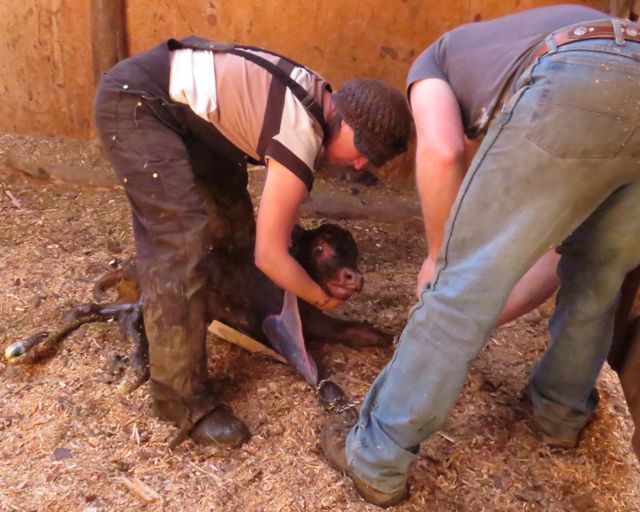 Punky’s much-loved and quite amazing dog Dealer is not allowed into the calving barn, but it doesn’t stop him intently watching.
Punky’s much-loved and quite amazing dog Dealer is not allowed into the calving barn, but it doesn’t stop him intently watching.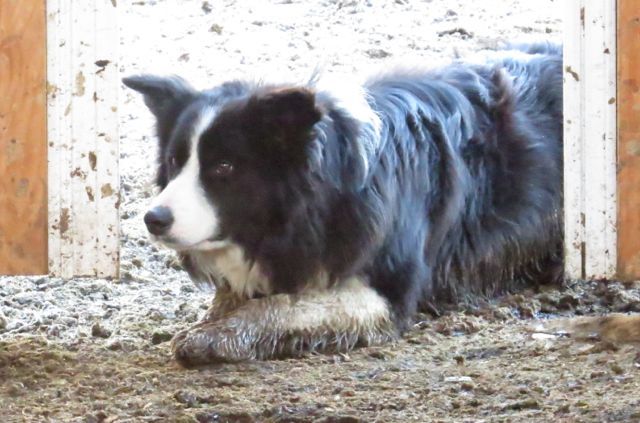 With no birth imminent, Punky had time to go into the house to marinate meat for supper and prepare the next batch of eartags.
With no birth imminent, Punky had time to go into the house to marinate meat for supper and prepare the next batch of eartags.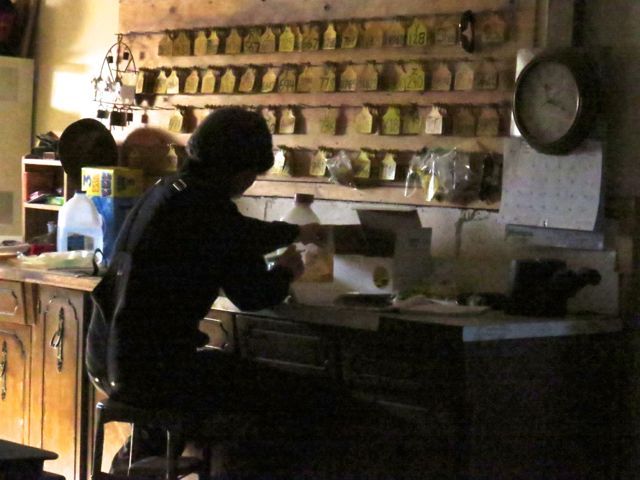 This little guy is about to get a set of earrings.
This little guy is about to get a set of earrings.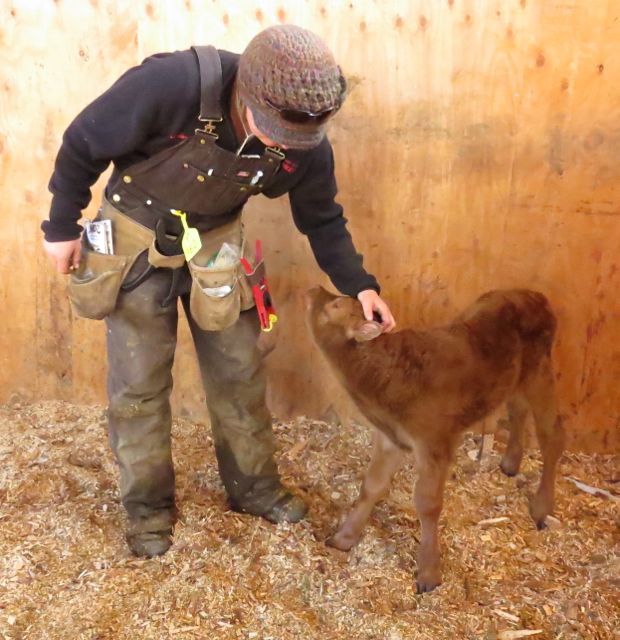 Punky waits until each calf has fed properly at least twice before she does this – the cow and calf can then go outside and make room for the next imminent mum.
Punky waits until each calf has fed properly at least twice before she does this – the cow and calf can then go outside and make room for the next imminent mum.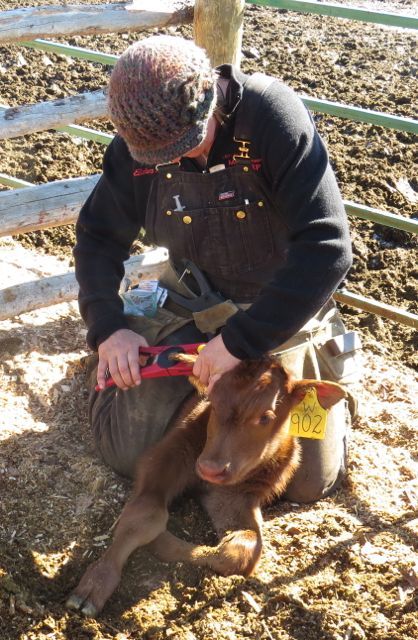 The big tag relates the calf to its mother. The small round one being attached now shows ownership of the animal and is essential when taking the calf to the sale ring. Unfortunately tags get pulled out sometimes as the cows move about their summer range. Punky would like to see microchips put in, like is done for pets and fancy livestock, but it hasn’t been accepted yet in the cattle industry.
The big tag relates the calf to its mother. The small round one being attached now shows ownership of the animal and is essential when taking the calf to the sale ring. Unfortunately tags get pulled out sometimes as the cows move about their summer range. Punky would like to see microchips put in, like is done for pets and fancy livestock, but it hasn’t been accepted yet in the cattle industry.
Finally, the calf is given an injection of vitamin E and Selenium. This country is deficient in that mineral. 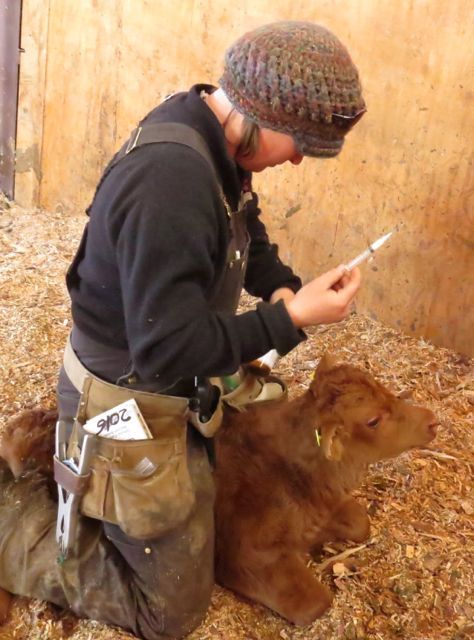 Unless the cow is sick somewhere along the way (which is rare), it is given no other injections. The ranches are not registered as organic – too expensive to bother with – but these animals will live their lives on wild grass eating wild hay and producing the best and healthiest meat available on this planet. Some might criticise the whole idea of ranching, but the climate up here precludes growing any other kind of food crop. I have a number of food sensitivities – I won’t touch factory-farmed meat, fish, eggs or milk, and feel so lucky that I have sources of such fine beef available to me.
Unless the cow is sick somewhere along the way (which is rare), it is given no other injections. The ranches are not registered as organic – too expensive to bother with – but these animals will live their lives on wild grass eating wild hay and producing the best and healthiest meat available on this planet. Some might criticise the whole idea of ranching, but the climate up here precludes growing any other kind of food crop. I have a number of food sensitivities – I won’t touch factory-farmed meat, fish, eggs or milk, and feel so lucky that I have sources of such fine beef available to me.

Hi Chris; I’ve just read Calving, Nicolog and Hyacinth. Being a city girl it was a great lesson to read Calving. Of course at almost 80, I do know what goes on to bring meat to our table but this was a wonderful story of a real part of our BC.
I have been to Germany so was interested in Nico’s business. They are a great hard working lot over there.
I don’t think I would eat my bouquet unless I knew it was very natural, no chemicals.
It is wonderful to read your posts, they take me far away from my little life here.
WOW, I’m tired just reading about the process of calving. Commitment and drive and a lot of muscle. Thanks for sharing your travels and happenings.